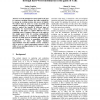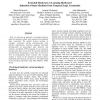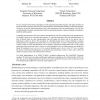1235 search results - page 232 / 247 » Structured Meanings in Computational Linguistics |
109
click to vote
CIG
2005
IEEE
15 years 5 months ago
2005
IEEE
Several attempts have been made in the past to construct encoding schemes that allow modularity to emerge in evolving systems, but success is limited. We believe that in order to c...
SAC
2004
ACM
15 years 5 months ago
2004
ACM
This paper describes wildcards, a new language construct designed to increase the flexibility of object-oriented type systems with parameterized classes. Based on the notion of v...
191
click to vote
EH
1999
IEEE
1999
IEEE
Evolvable Hardware or Learning Hardware? Induction of State Machines from Temporal Logic Constraints
15 years 4 months ago
Here we advocate an approach to learning hardware based on induction of finite state machines from temporal logic constraints. The method involves training on examples, constraint...
104
click to vote
PPOPP
1999
ACM
15 years 4 months ago
1999
ACM
The use of threads is becoming commonplace in both sequential and parallel programs. This paper describes our design and initial experience with non-trace based performance instru...
EDCC
1994
Springer
15 years 3 months ago
1994
Springer
Security and reliability issues in distributed systems have been investigated for several years at LAAS using a technique called Fragmentation-Redundancy-Scattering (FRS). The aim ...



